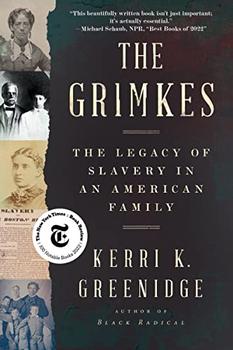Summary | Excerpt | Reviews | Beyond the book | Read-Alikes | Genres & Themes | Author Bio

The Legacy of Slavery in an American Family
by Kerri K. GreenidgeMany people familiar with antebellum American history are acquainted with the white Grimke sisters, Sarah and Angelina, famous for leaving behind their privileged southern plantation lives to become fierce abolitionist activists in the North. Odds are, not as many know about the Black Grimkes and their outsized contributions to achieving racial and gender equality in the latter nineteenth century and early twentieth. Historian Kerri K. Greenidge's meticulously researched The Grimkes: The Legacy of Slavery in an American Family offers the full poignant story, revealing a complex picture of the Grimke clan and their often-fraught relationships with each other.
The Grimke family tree contained several branches, with given names often repeating themselves from generation to generation, so it is apt that Greenidge provides a "cast of characters" as the reader sets off. The focus of the book falls primarily on the white Grimke sisters (Sarah Grimke and Angelina Grimke Weld); their Black nephews (Archibald [Archie], Francis [Frank], and John Grimke); Frank's wife Charlotte Forten Grimke; and Archie's daughter, Angelina Weld Grimke, a poet and playwright of the Harlem Renaissance. Through these Black Grimkes (and their white and Black contemporaries) Greenidge seeks to recount "the stories that families tell themselves about the racial trauma in their past."
Sarah and Angelina Grimke, devout Christian women raised on a Charleston, South Carolina, plantation at the turn of the nineteenth century, witnessed the evils of slavery firsthand. They both boldly left their lives and family behind and moved to Philadelphia (Sarah in 1821, Angelina in 1829) to be free to work for various abolitionist and women's rights causes. Indeed, Angelina would go on to pen two landmark works of the radical abolition movement: Appeal to the Christian Women of the South (1836) and Appeal to the Nominally Free States (1837).
Yet within this ostensible "story of righteous white women redeemed from their slaveholding birthright through their conversion to radical abolition," Greenidge traces how the Grimke sisters' attitudes toward their slaveholding past evolved as they drifted further from it. They tolerated the sadistic abuse their slaveholding brother Henry F. Grimke "inflicted on the enslaved, even as this abuse produced the Black nephews for whom they later claimed to selflessly provide." Greenidge also calls out the racial paternalism that inhibited them from seeing Black people as anything other than "a cause to be won or a sin for which they must atone."
With the births of Archibald, Francis, and John Grimke (children of Henry and Nancy Weston, his enslaved common law "wife"), Greenidge charts the expansion of the family tree as the three boys experienced the racial trauma of their early enslavement, emancipation, and (at least for Archie and Frank) a spot among the post–Civil War Black elite in Boston. Although the white Grimke sisters accepted, loved, and supported their Black nephews' education and endeavors, Greenidge claims it came at a cost: "the brothers' unwavering personal and professional exceptionalism and constant genuflection before the Grimke sisters' supposedly steep sacrifice." Archie and Frank internalized these messages of racial exceptionalism and bought into the ethos of a "colored elite" consumed with outward appearances of education, frugality, and business savvy as a way "to distinguish themselves from the masses of economically exploited, segregated, and disenfranchised negroes whose fate they narrowly escaped."
Greenidge tackles such thorny topics as Black "racial respectability," class, feminism, and memory in a sensitive yet academically sturdy manner that invites more engagement with her subjects, particularly the famed Harlem Renaissance poet and playwright Angelina Weld Grimke. She stands apart immediately in Greenidge's striking prose:
In all the pictures of the Grimke family—the painted portraits of eighteenth-century Charles Town; the daguerreotype of Sarah and Angelina taken twenty years after they first arrived on the abolitionist stage; the head shot of Charlotte Forten Grimke, hair plaited neatly on the either side of a deeply brown and effortlessly smooth-skinned face—Angelina Weld Grimke is the only woman in her family tree whose eyes are always sad.
Daughter of Archibald Grimke and Sarah Stanley, a white woman who eventually abandoned her family and committed suicide, Angelina Weld Grimke grew up with questions about her family's complicated racial past as well as her own individual identity. A gifted writer, she channeled her emotions into art, doing "what she had always done: she wrote about the rage inspired by the racial system for which the rhetoric of Black excellence and racial exceptionalism had left her unprepared." Greenidge trenchantly interprets a number of Angelina's writings and concludes they "reflected the abject horror and unacknowledged sorrow of a generation just discovering the lie at the heart of the racial respectability ethos under which they were raised."
The Grimkes is a magnificent work of scholarship but equally an indelible human portrait of a family shaped by the same racist, violent world they sought to reshape into something better.
![]() This review was originally published in The BookBrowse Review in January 2023, and has been updated for the
February 2024 edition.
Click here to go to this issue.
This review was originally published in The BookBrowse Review in January 2023, and has been updated for the
February 2024 edition.
Click here to go to this issue.

If you liked The Grimkes, try these:

by Stephen Puleo
Published 2024
The groundbreaking biography of a forgotten civil rights hero.

The Love Songs of W.E.B. Du Bois
by Honorée Fannone Jeffers
Published 2022
The 2020 National Book Award–nominated poet makes her fiction debut with this magisterial epic - an intimate yet sweeping novel with all the luminescence and force of Homegoing; Sing, Unburied, Sing; and The Water Dancer - that chronicles the journey of one American family, from the centuries of the colonial slave trade through the Civil War ...
What really knocks me out is a book that, when you're all done reading, you wish the author that wrote it was a ...
Click Here to find out who said this, as well as discovering other famous literary quotes!
Your guide toexceptional books
BookBrowse seeks out and recommends the best in contemporary fiction and nonfiction—books that not only engage and entertain but also deepen our understanding of ourselves and the world around us.